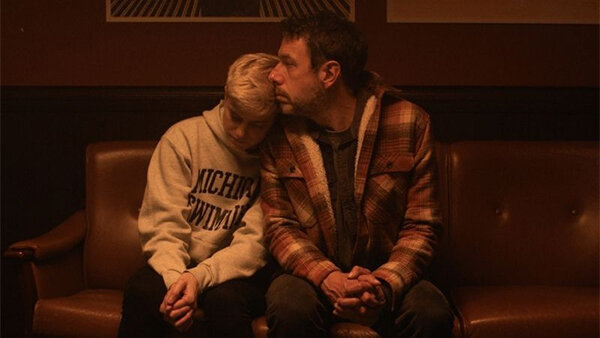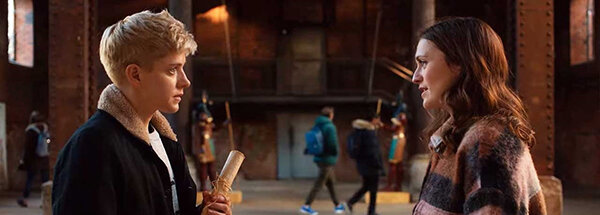With the second and final season of Feel Good, Mae Martin brought to the small screen an acute understanding of how nostalgia can corrupt histories of abuse – how you can hold space for someone who doesn’t deserve it, how terrifying closure is, how odd coping rituals can take on immense power. Saffron Maeve waves goodbye to one of the best TV series in recent memories – and celebrates that Phoebe Bridgers needle drop.
You remember too much,
my mother said to me recently.
Why hold onto all that? And I said,
Where can I put it down?
— Anne Carson, The Glass Essay
“People are obsessed with trauma these days,” says Mae Martin in the second season of Feel Good. “It’s like a buzzword. People love talking about trauma. It’s overdone, you know?” They’ve just been told they have Post-Traumatic Stress Disorder and characteristically laugh it off. I laugh too, or maybe wince, because I know I’ve said these words almost verbatim and can’t help but wonder if I looked as helpless as Mae did when I said them.
Feel Good is a tenderhearted beast. It understands how, in a moment, getting a text from the wrong person can suck the sound out of a room, or how sensible sliding under a bed can feel in the throes of a panic attack. Based largely on Martin’s past, and co-written by Martin and Joe Hampson, the series threads codependency, addiction, and sexuality into a charming love story between Mae (Martin) and George (Charlotte Ritchie).
The first season of Feel Good explores Mae’s addictive behaviours, how shame can shape intimacy, and the perils of self-destructing with others in the blast zone. The second and final season sees Mae considering their relationship with gender in an industry fixated on binaries, and George making strides to uncover her own interests (namely, bees, teaching, and social advocacy). While they fall into the odd codependent sandtrap, Mae and George slowly grow into each other’s needs, like two roots twirling together under wet soil.
What looms heavy over season two, however, is an abusive relationship from Mae’s past. In their 2019 special, Dope, part of Netflix’s Comedians of the World series, Martin revealed that as a teenager, they were in a “secret relationship” with a much older man. In the first episode, we’re introduced to Scott (John Ross Bowie), Mae’s old roommate from the Toronto comedy circuit, when he comes to pick her up after less than 24 hours of rehab. “I just want to move forward and they keep pulling me back,” Mae tells him. Scott nods, he understands. But as the season unfolds, the horrific details of their past arrangement become increasingly clear.
When I first sensed who Scott was, I became acutely aware of my breathing. The air around and inside me was suddenly heavier and I kept pressing pause, only to exhale, feel my eyes well up, and hit play again. Watching Mae push through panic attacks and seek out comfort in confined spaces, all while slowly recalling the repressed parts of their past, felt like a punch to the gut. I knew this person too well.
What strikes a chord when I encounter stories about abuse, in addition to the obvious discomfort and delicacy of the subject matter, is how tightly they focus on getting closure. I hate closure. All my relationships either taper off into nothing or end up feeling like a fist relentlessly thwacking against a drum. Closure necessitates two traits: the ability to admit that things happened—good and bad—and the self-belief to know you’re making an emotionally mature decision. I have neither.
So it’s the last ten minutes of Feel Good that chew on my heart the most. Mae and George, now in Canada, are driving up to a lake to spend real time together after months of reevaluating what their relationship should look like. But first, they make a stop at a comedy club in the city, so that Mae can confront their ghost.
Crucially, the first thing Mae does is implicate the men sitting at the table with Scott: “They can stay. They knew. Everybody knew.” They leave anyway.
The conversation that follows is agonising. As Mae lets over a decade of feeling pour out of them, Scott ponders getting cancelled and confesses that he felt “entitled to a bit of relief” for housing them and trying to keep them clean as a teenager. His rendering of the past is unfurled in the ugliest way: empty apologies, contradiction, blame. “All the love in my chest is like tied up snakes.” Mae says, their voice thinning with each word.
Scream at him, I think to myself. Call him what we know he is. Instead, Mae exhales and opens their arms to him. They hug. They say “I love you.” Mae tells Scott they never wants to see him again, and for a sliver of a second, smiles. Here, the knot in my throat sank to the pits of my stomach and stayed there for a little while, curling into itself every so often. I didn’t know that closure could look like care.
I instantly thought of I May Destroy You and the fantasies its protagonist, Arabella, plays out to reconcile with an assault: beating her rapist to death, uncoiling his motivations, sleeping with him of her own volition. Both series see self-reconciliation for what it is — jagged, exhausting, warm.
Mae and Scott’s storyline exemplifies how nostalgia can corrupt one’s understanding of abuse and how slippery and selective memory can be. In episodes four through six, Mae recounts being chased by a bear and soon after reveals that they don’t know if it ever actually happened. Sometimes, I’ll chuck out an anecdote from my teens at dinner and spend the rest of the night wondering if I fabricated the whole thing. To this day, I can’t remember whether the racist who hated me in middle school really pushed me down a flight of stairs or just threatened to.
We’re very much alike, but where Mae leans into good memories in order to suppress the bad ones, I cling to bad memories in fear of leftover joy making me homesick for someone I can’t love. Throughout the season, Mae makes excuses for Scott: downplaying his abuse, chalking up their situation to fucked up circumstances, and (implicitly) defending him when a woman calls to share a similar experience. Years later, I still avoid spaces that make me feel good because I’m desperate to sever my happiness from my hurt. Neither of us are doing the right thing; Mae’s approach was detrimental to their health and my fear of closure has only made me more bitter, afraid, and heavy with anger.
After a brief stop to vomit and one of their signature I-understand-you-too-much glances, Mae and George are off again. The opening notes of Phoebe Bridgers’ “Motion Sickness” play over their car weaving through the Ontario countryside — a fitting needle drop written about Bridgers’ own experience being abused by an older man, and the ever-familiar paradox of carrying love for somebody who hurt you.
I hate you for what you did,
And I miss you like a little kid.
Mae and George sit on a dock, swathed in the greens and ambers of nature in lieu of their familiar London grey. For the first time in a long while, they just exist in each other’s company. They talk about ice fishing and the future, chlorophyll and moving to Spain. The camera pulls farther and farther away until they’re so small, they could be anybody.
Saffron Maeve (@saffronmaeve) is a culture writer pursuing a BA in Cinema Studies and English at the University of Toronto. When she’s not writing, she can be found rewatching The Goonies and pestering everyone she knows to do the same.



